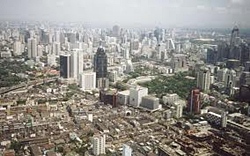BANGKOK, Aug 22 – The Thai economy is expected to expand by 3.5-4 per cent in 2011, lower than the 3.5-4.5 per cent projected in May, according to the National Economic and Social Development Board (NESDB).
Thailand’s economy in this year’s second quarter grew by 2.6 per cent, decreasing from 3.2 per cent in the first quarter, NESDB Secretary General Arkhom Termpittayapaisith told a press briefing on Monday.

The falling performance figure was partly attributed to contractions in the manufacturing sector affected by Japan’s devastating earthquake and tsunami, and the subsequent contraction of the Japanese economy as well as reduction in total investment.
Consequently, the Thai economy grew by 2.9 per cent in the first half of 2011.
After seasonal adjustment, the gross domestic product (GDP) is projected to grow in the range of 3.5-4.0 per cent while headline inflation is forecast to be in the range of 3.6- 4.0 per cent.
The adjustment was owing to the fluctuation of oil prices, the delay of government budget disbursements in 2012, risks on global economic recovery, particularly the higher risk of economic recession in the US and the continuing European public debt issues, and the risk of volatility related to the money market, the capital market and the foreign exchange rate.
In addition, the Thai baht tends to appreciate in the latter half due to depreciation of US dollar, according to the NESDB secretary general.
The two other risks and limitations related to the country’s economic growth were the condition of agricultural production and farm income remaining vulnerable to the impact of fluctuating weather after increasing flood frequency since late 2010 and the inflation rate and interest rate remaining high.
Regarding the interest rate, Mr Arkhom expected that the Monetary Policy Committee (MPC) will monitor and proceed with its policies in accordance with the current situation.
During the past decade, state investment decreased to 24 per cent from 40 per cent in 1997.
During the second quarter, the MPC decided to raise the policy interest rate twice, a total of 0.5 per cent, from 2.50 per cent to 3.00 per cent per annum.
The recent policy rate hike was in line with monetary policy in the Asian region and emerging market countries, which aim to curve down their overheated economies and inflationary pressures to a sustainable level.
In July, the MPC decided to raise the policy interest rate by 0.25 per cent. Thus, the policy interest rate at present was at 3.25 per cent per annum.
However, the administration of the new government will help boost the confidence of consumers and investors, Mr Arkhom added.




